Products made from Bamboo are becoming more and more popular as people nowadays search for eco-friendly products. Bamboo helps to fight against climate change by absorbing a lot of carbon dioxide.
Unlike other types of wood, bamboo grows much faster, making it the best renewable resource. Additionally, it doesn’t need fertilizers or pesticides to grow, which keeps the soil healthy and pollution-free. Bamboo’s ability to adapt and grow in different climatic conditions makes it a perfect option to help with today’s environmental issues.
Introduction
Bamboo may look like a tree, but it’s actually a type of grass! There are thousands of species of bamboo growing all over the world. However, only a few of them are commonly used because of their special qualities and strength.
Strength and Durability: Species like Dendrocalamus strictus and Bambusa bambos are famous for their incredible strength and durability, so they can be used for construction, like scaffolding and building materials. In fact, their strength is often compared with steel.
Flexibility: Varieties like Bambusa tulda and Bambusa vulgaris are very flexible, which makes them the best material for creating woven products, like baskets, hats, and other handicraft items. For example, their soft and flexible nature allows artists to weave them into complex designs and structures for baskets, mats, and even furniture.
Aesthetic Appeal: Certain species, like Phyllostachys aurea, are well-known for their beautiful appearance, which makes them perfect for decorative items and home furniture. For example, bamboo is often used for wooden flooring because of its smooth texture and elegant look. This adds a natural and stylish touch to your home.
Sustainability: Bamboo is more sustainable because it grows much faster than trees. While soft and hardwood trees take 15-20 years to mature, bamboo is ready in just 3-5 years. Plus, bamboo absorbs a lot of carbon dioxide and releases more oxygen than trees, making it an even better choice for the environment.
Choosing bamboo over traditional wood helps to reduce deforestation and supports a healthier planet.
Bamboo is becoming an important material in many industries, especially for those looking for eco-friendly and sustainable products.
Whether it’s for building, crafts, or home decor, bamboo offers a green solution for a wide range of products.
Benefits of Bamboo Products
Bamboo possesses a range of inherent properties that make it a truly remarkable and sustainable material, both scientifically and practically.
Anti-Bacterial
Bamboo products or fibers have natural antibacterial properties, which are believed to be a result of its biological compound called “bamboo kun”.
Bambu Kun disrupts the cellular functions of bacteria, fungi, pests, and molds, which makes it difficult to survive. This is the reason bamboo cultivation doesn’t require pesticides.
This biological compound called Bamboo Kun is embedded in bamboo fibers, which are insoluble in water.
So, even after processing bamboo into various products, like bamboo clothing, bamboo furniture, bamboo kitchenware, bamboo paper, and other products made from bamboo, a major portion of this anti-bacterial compound remains in the products or fibers, providing an extra layer of protection.
Because bamboo kun naturally exists in the bamboo fibers, bamboo products often do not require artificial antimicrobial treatments, making them more environmentally friendly.
The natural antibacterial properties are sufficient to keep the products hygienic.
Anti-Fungal
The antifungal properties of bamboo products are because of their phenolic compound and bamboo kun.
Phenolic compounds can disrupt the lipid bilayer of fungal cell walls, which causes leakages of cellular content and cell death.
Generally, fungi depend on certain enzymes to break down organic material for getting nutrition. These phenolic compounds of bamboo products inhibit the growth of essential enzymes and thereby stop the fungus growth.
Bamboo products are becoming more popular in high-humidity areas, where the damp environment increases the chances of fungal growth.
Even after multiple processing of bamboo into products like furniture, utensils, textiles, or flooring, bamboo kun, and phenolic compounds can be retained in the bamboo fibers or products.
Excellent Absorbent and Moisture Wicking
The excellent absorbent properties of bamboo fibers are because of their hollow nature and unique microstructure.
Bamboo fibers are naturally hollow having multiple micro-gaps and micro-holes. These micro-gaps allow the fibers to absorb and hold, more moisture as compared to other fibers, like cotton.
Bamboo fibers can absorb up to 40% more water than even the best cotton materials, which makes bamboo an excellent absorbent material.
Even more, the hollow structure of bamboo fibers allows air to flow easily through the material, which enhances the evaporation of moisture. This means that while absorbing large amounts of moisture, bamboo fabric can dry quickly.
Its excellent moisture-wicking properties make bamboo-based fabrics a preferred choice for athletic wear and bamboo diapers.
Odor Removal
Odor removal properties of bamboo fibers are because of their porous structure, natural antibacterial properties from bamboo kun, and the moisture-wicking ability.
Bamboo kun inhibits the growth of bacteria, fungi, and other microorganisms. Since bacterial growth is the major source of unpleasant odors, preventing their growth helps to keep bamboo products free from bad smells.
This makes bamboo clothing, towels, and bed sheets stay fresh for a longer time, even after repeated use.
Additionally, when bamboo is carbonized (heated at high temperatures), it becomes bamboo charcoal, which has an exceptionally large surface area with a network of tiny pores.
These pores do the adsorption process, where odor-causing molecules get trapped on the surface of the bamboo charcoal thus neutralizing bad smells.
Unlike synthetic deodorizing agents that mask smells, bamboo charcoal actually adsorbs and neutralizes odors.
Even more, bamboo charcoal can be reactivated by placing it in sunlight. The heat from the sun helps to release trapped odor molecules, which allow them to be reused for months to years.
UV Protection
The UV protection properties of bamboo fabrics or curtains are primarily due to the presence of lignin, the dense and thick structure of bamboo fibers, and phenolic compounds that can block UV radiation.
Lignin is a complex organic polymer found in the cell walls of bamboo plants. It absorbs UV light, particularly in the range of UVA (320-400 nm) and UVB (280-320 nm) spectrum.
The natural presence of lignin in bamboo fibers helps to block UV radiation and provides a degree of UV protection when used in fabrics or curtains.
Bamboo fabrics, especially those that are tightly woven or naturally dense, can have a high UPF rating. UPF measures how much UV radiation a fabric allows to reach to the skin.
Bamboo fabrics tend to have a UPF rating in the range of 20-50, depending on factors like fiber density, thickness, and weave.
A UPF rating of 50, for example, means that only 1/50th of the UV radiation passes through the fabric, offering significant protection.
Bamboo contains various phenolic compounds, which have the ability to absorb UV light due to their chemical structure, which contains aromatic rings that can interact with UV photons. This increases the effectiveness of bamboo in UV protection.
Carbon Absorption and Oxygen Release
Bamboo is best for absorbing CO2 and absorbs up to 12 tons of carbon dioxide per hectare annually. It releases 35% more oxygen compared to equivalent trees, which makes it an excellent plant to fight against climate change.
Compostability and Biodegradability
Bamboo is completely biodegradable and compostable. Whether used in textiles, packaging, or construction materials, bamboo can decompose naturally within a few weeks to months. This makes bamboo products environmentally friendly and reduces waste in landfills.
In short, bamboo is not only strong and useful but also has many features that make it good for the environment. This makes it an important material for a greener future.
List of Products Made from Bamboo
1. Bamboo Diapers
When it’s time to choose the best diapers for your baby, bamboo baby diapers are a far better option than traditional diapers.
Bamboo diapers are made from bamboo fibers, which offer numerous benefits for both your baby and the environment.
Bamboo fibers are naturally anti-bacterial, anti-fungal, and hypo-allergenic, which helps to keep your baby’s skin healthy and rashes-free.
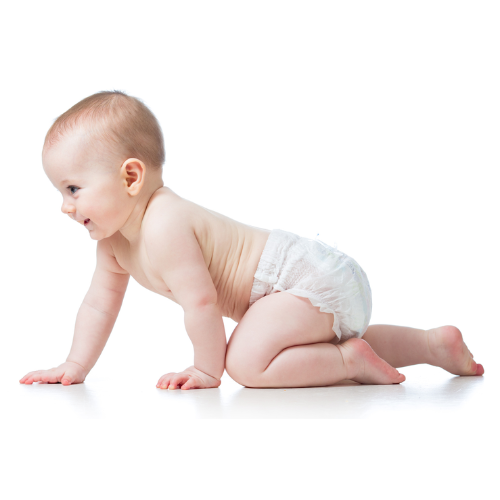
In addition to being the best choice for your baby, bamboo diapers are also highly absorbent. They can absorb more liquid as compared to traditional diapers, keeping your baby dry and comfy for a longer time.
This makes them an excellent choice for nighttime use or during long traveling.
On the other hand, traditional diapers are made from plastic, synthetic materials, and other chemicals. These materials are not only harmful to the environment but also contribute to the growing problem of landfill waste, as they take hundreds of years to decompose.
By switching to bamboo diapers, you’re making a sustainable choice that’s better for your baby and the planet. They offer a comfortable, rash-free experience while helping to reduce plastic waste.
2. Bamboo Clothing
Bamboo fabric is becoming a popular choice for clothing, bed linen, socks, towels, and other everyday items because of its soft and breathable nature.
Made from natural bamboo fibers, this fabric is not only soft and comfortable but also the best sustainable material.
Bamboo fabric is strong and durable, making it the best choice over synthetic and non-biodegradable materials like nylon and polyester. Nylon and polyester take hundreds of years to break down and contribute to environmental pollution.
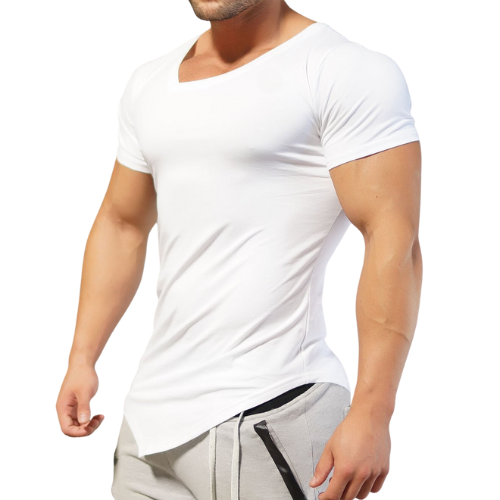
One of the standout features of bamboo clothing material is its excellent moisture-wicking properties.
It absorbs moisture and takes it away from the skin through capillary action, which keeps you dry and comfortable all the time. Best for the outdoor clothing and bed linen.
Bamboo fabric also has natural odor-resistant qualities, which helps to keep your socks and towel odor-free for a longer time, even after repeated use.
In addition to its soft and comfy nature, the bamboo clothing material offers UV protection during outings, which protects your skin from the sun’s harmful radiation.
Unlike cotton and other clothing materials, bamboo fabrics don’t go shrink upon washing and remain strong even after multiple washing.
Compared to synthetic materials like nylon and polyester, bamboo fabric is not only better for the planet but also provides more comfort and protection for everyday use.
3. Bamboo Furniture
Bamboo furniture is a beautiful and sustainable addition to your home, which combines style, strength, and sustainability at a time.
Known for its natural elegance and unique texture, bamboo furniture instantly elevates the aesthetic look of your home, adding warmth and a touch of nature.
But it’s not just about looks—bamboo is one of the most durable materials available today, making it perfect for crafting furniture that lasts for a long time.
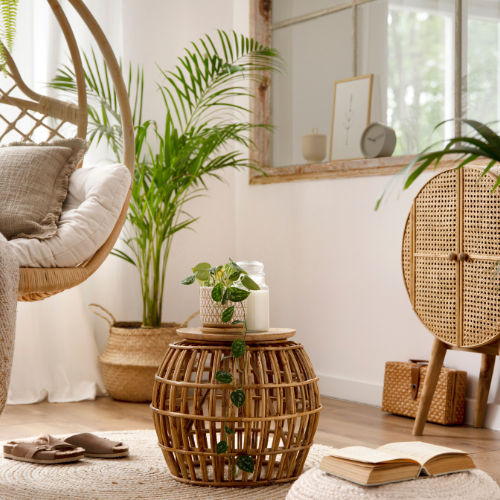
Bamboo’s strength is comparable with that of hardwoods, yet it is much lighter, and making bamboo furniture both sturdy and easy to move.
This durability means that bamboo tables, chairs, and cabinets can withstand daily wear and tear without losing their shape or charm.
Additionally, bamboo is highly resistant to moisture and pests, ensuring that your investment remains in top condition for years to come.
Moreover, bamboo’s rapid growth rate and minimal need for pesticides make it an incredibly sustainable choice, offering all the benefits of traditional wood without contributing to deforestation.
Choosing bamboo furniture is not just a statement of style but a commitment to a greener planet.
With its combination of durability, aesthetic appeal, and environmental benefits, bamboo furniture effortlessly blends function and fashion, making it a perfect choice for any eco-conscious home.
4. Bamboo Flooring
Bamboo flooring is an excellent sustainable alternative to traditional hardwood flooring.
One of its key benefits is its strength, which is often comparable to steel. Bamboo is durable and stronger than other hardwoods like oak or maple.
This makes it perfect for high-traffic areas in homes or business offices. Additionally, bamboo grows much faster than hardwood trees, taking only about 3-5 years to mature, while other trees take 10-15 years.

This rapid growth rate makes bamboo the best renewable resource, which helps to preserve forests and reduce deforestation.
Another advantage of bamboo flooring is its natural resistance to termites. Unlike regular wood, which is prone to termite infestations, bamboo has natural anti-bacterial and anti-fungal properties that keep them safe and durable for a longer time without any maintenance.
Furthermore, bamboo flooring offers a beautiful and natural appearance, while being an eco-friendly wooden material.
By choosing bamboo flooring, you’re opting for strength, sustainability, and protection from termites, making it a smart, long-lasting solution for your home and office.
5. Bamboo Curtains
Bamboo curtains are an excellent choice for homeowners looking for durability and sustainability.
Compared to cotton or polyester curtains, bamboo curtains are much stronger and more resistant to wear and tear, even after long usage.
Unlike cotton, which can shrink or weaken over time, or polyester, which may lose its shape, bamboo curtains retain their strength and structure, offering long-lasting use.
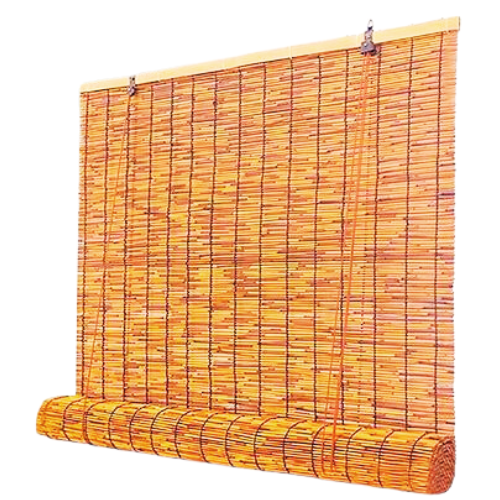
One of the standout features of bamboo curtains is their natural UV protection. Bamboo fibers help to block harmful UV rays from entering into your home and protect not only your skin but also your furniture and home decor from fading or damage caused by sun exposure.
This makes bamboo curtains a practical and eco-friendly choice for homes and offices that get a lot of sunlight.
In addition to their strength and UV protection, bamboo curtains offer a beautiful, natural look that complements a wide range of interior styles.
They are also biodegradable and compostable, which makes them a more sustainable option as compared to synthetic materials like polyester and nylon.
By choosing bamboo curtains, you’re selecting a product that’s not only stronger and longer-lasting but also better for the environment.
6. Bamboo Paper
Bamboo tissue paper is an eco-friendly and sustainable alternative to regular tissue paper.
Unlike traditional tissue paper, which is typically made from trees and contributes to deforestation, bamboo tissue is made from fast-growing bamboo plants that regenerate quickly, making it a much more renewable resource.
Bamboo can grow up to 3 feet per day, which means harvesting bamboo for tissue paper has a much smaller environmental impact as compared to cutting down other trees, which take time to mature.
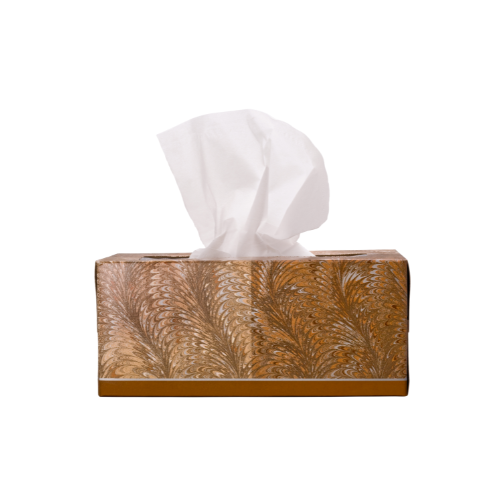
In terms of strength and softness, bamboo tissue paper is highly durable and gentle on the skin. It doesn’t tear easily, which provides a better experience during usage, while regular tissue paper often rips or falls apart.
Additionally, bamboo tissue paper is naturally hypoallergenic and anti-bacterial, making it a great choice for people with sensitive skin or allergies.
Another major advantage of bamboo tissue paper is its biodegradability and compostability. Unlike other regular tissue paper, which may contain chemicals and take a longer time to decompose, bamboo tissue paper breaks down quickly and enriches the soil, as it is made from natural bamboo fibers without adding chemicals.
By switching to bamboo tissue paper, you’re not only reducing your environmental footprint but also choosing a stronger, more sustainable product that is better for both you and the planet.
7. Bamboo Straws
Bamboo straws are a fantastic eco-friendly alternative to plastic straws.
Made from natural bamboo material, they are reusable, biodegradable, compostable, and sustainable.
Unlike plastic straws, which are used once and then take hundreds of years to break down, bamboo straws decompose naturally without harming the environment.
One of the major benefits of bamboo straws is their durability. Bamboo is a strong material, so these straws can be reused multiple times, reducing the need for single-use plastics.
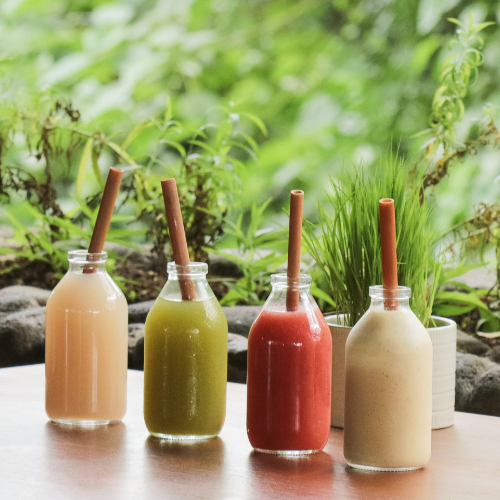
Bamboo straws are also safe to use, free from chemicals, and don’t leach harmful substances into your drinks like plastic straws. Plastic straws are made up of petroleum-based polymer and other toxic additives like phthalates and BPA.
In contrast, plastic straws contribute to the growing problem of ocean pollution and landfill waste. They are a significant threat to marine life and ecosystems, as they break down into microplastics that remain in the environment for years.
Additionally, bamboo straws are easy to clean and maintain, and they don’t absorb flavors or odors, ensuring a fresh drinking experience every time.
By switching to bamboo straws, you’re making a sustainable, eco-friendly choice that helps to reduce plastic waste and supports a cleaner, healthier planet.
Plus, they add a stylish, natural touch to your beverages!
8. Bamboo Kitchenware
Bamboo food containers and kitchenware items are a sustainable and stylish alternative to plastic and other non-biodegradable materials.
Made from natural bamboo fibers, these products are eco-friendly and biodegradable, making them a perfect choice for those looking to reduce plastic waste.
Unlike plastic containers, which can leach harmful chemicals into your food, bamboo kitchenware is chemical-free, which ensures a safe and healthy option for storing and serving food. These are also remained safe upon storing acidic food items.
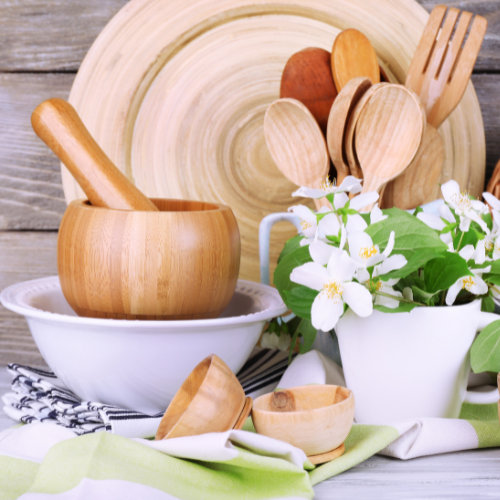
One of the best features of bamboo kitchenware is its resistance to stains and odors, making it easy to clean and maintain.
Plus, bamboo has anti-bacterial and anti-fungal properties, keeping your food fresh and safe for a longer time.
Bamboo kitchen items, such as bowls, plates, utensils, and containers, are also incredibly strong and durable.
By choosing bamboo food containers and kitchenware, you’re opting for a sustainable, durable, and non-toxic material that helps to reduce plastic waste and is better for both your family and the environment.
They’re also stylish, adding a natural touch to any kitchen!
9. Bamboo Toys
Bamboo toys are a fantastic choice for modern parents looking to give their children a safe and eco-friendly play experience.
Unlike plastic toys, which often contain harmful chemicals like BPA, phthalates, and other toxic additives, bamboo toys are made from a natural, sustainable material that is free from these dangerous chemicals.
This makes them especially ideal for young children who are prone to chew their toys frequently.
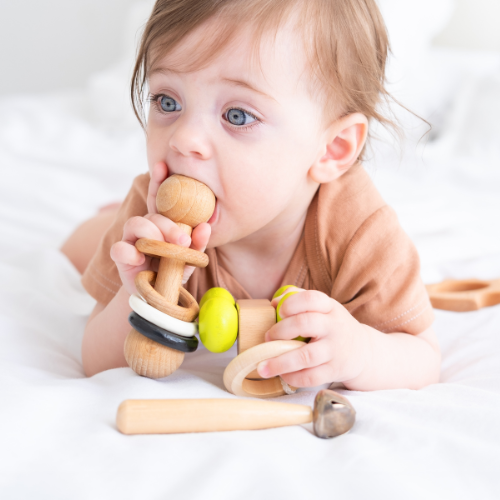
What’s more, bamboo is naturally antibacterial, and antifungal, which means it resists the growth of harmful bacteria, fungi, pests, and molds on the surface of toys.
This feature is crucial because little ones often put toys in their mouths, making hygiene an important consideration.
With bamboo toys, parents can provide an extra layer of protection to their kids, while protecting the environment from plastic pollution.
Beyond safety, bamboo toys are durable, lightweight, and often beautifully crafted, making them not just a safer choice but also a more aesthetically pleasing one.
Choosing bamboo toys over plastic is a small yet impactful step towards reducing plastic pollution and promoting a healthier lifestyle for our kids.
So, when it’s time to play, why not select a toy that’s safe for your kids and planet?
10. Bamboo Toothbrush
Bamboo toothbrushes are a smart and eco-friendly alternative to traditional plastic toothbrushes, offering a healthier option for both you and the environment.
Made from sustainable bamboo, these toothbrushes are free from harmful chemicals like BPA, which is often found in plastic. This makes them a safer choice, especially for those looking to reduce their exposure to toxic additives in their daily life.

One of the best features of bamboo is its natural antibacterial properties, which help to keep your toothbrush cleaner and fresher for a longer time.
Plus, the soft bristles are gentle on your gums while still being effective in removing plaque and promoting good oral hygiene.
And when it’s time to replace your toothbrush, you can simply compost the bamboo handle without damaging the environment.
Switching to a bamboo toothbrush is a small yet impactful step towards reducing plastic waste, as billions of plastic toothbrushes end up in landfills every year.
With a bamboo toothbrush, you can feel good about making a sustainable choice that contributes to a healthier planet—one brush at a time.
Why not start your day with a product that’s good for your smile and the Earth?
11. Bamboo Charcoal Air Purifiers
Bamboo charcoal air purifiers are a natural and effective way to keep your indoor air fresh and clean.
Unlike conventional air fresheners that often contain artificial fragrances and harmful chemicals, these purifiers use the natural absorbent properties of bamboo charcoal to eliminate odors and moisture from the air.
The secret behind their effectiveness lies in the porous structure of bamboo charcoal, which helps trap allergens, pollutants, and excess humidity, making your living space healthier.
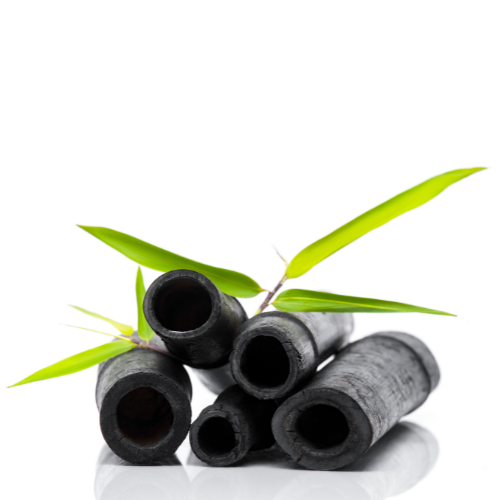
Whether you want to get rid of pet smells, smoke, or moldy odors, bamboo charcoal air purifiers work silently without releasing any toxins.
Another great benefit is their reusability. You can simply place the charcoal bags in the sunlight once a month to reactivate their purifying properties, making them last for up to two years.
This feature not only saves you money but also reduces waste, as you won’t need to frequently replace them like other air fresheners.
When the charcoal finally reaches the end of its lifespan, it can be used as a natural fertilizer for your plants, adding nutrients to the soil.
So, switching to bamboo charcoal air purifiers is a simple yet impactful way to improve indoor air quality while embracing a zero-waste lifestyle.
With bamboo charcoal air purifiers, you’re not just making your home smell fresher—you’re making an environmentally conscious choice that benefits both your family and the planet.
Conclusion
In conclusion, products made from bamboo offer a versatile, sustainable, and eco-friendly alternative to traditional materials across various everyday items. From baby diapers, fabrics, and straws to flooring, curtains, and kitchenware, bamboo’s natural strength, durability, and beneficial properties like UV protection, anti-bacterial qualities, and biodegradability make it a superior choice. By choosing products made from bamboo, we not only benefit from their long-lasting, functional features but also contribute to reducing environmental impact, promoting a greener and healthier planet for future generations.
Frequently Asked Questions
Yes, bamboo products can hold water, but it depends on how they are treated and used. Bamboo is naturally strong and has a unique structure that allows it to store liquids for a certain time. When used properly, bamboo can be a sustainable and effective material for holding water.
Yes, bamboo products often need to be tested for humidity and moisture resistance, especially if they are intended to hold liquids or be used in environments with varying moisture levels. Bamboo is a natural material that is somewhat sensitive to changes in humidity, and without proper treatment, it can absorb moisture, which might lead to issues like swelling, warping, or even mold growth.

Pretty! This has been a really wonderful post. Many thanks for providing these details.